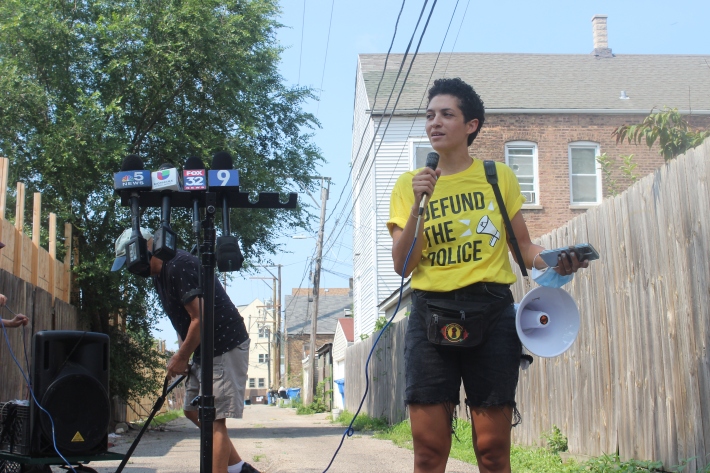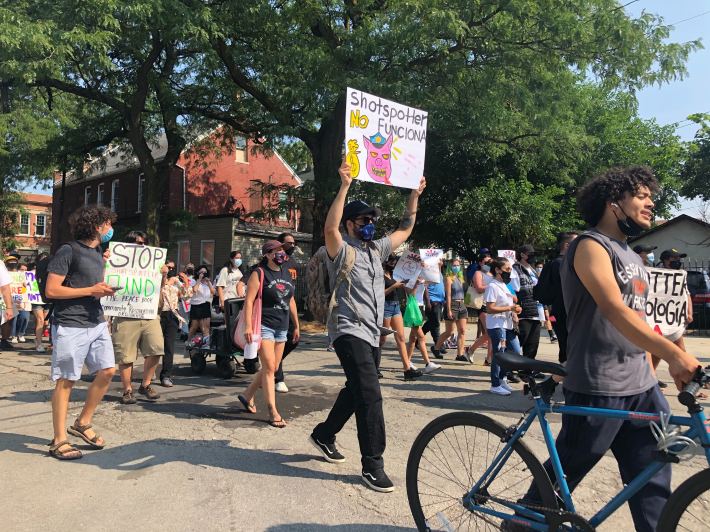ShotSpotter is touted by police for its real-time gunshot detection technology, but recent reports have cast doubt on its reliability.
Gathered near the alley where police fatally shot 13-year-old Adam Toledo months ago, activists from across the city converged Thursday in Little Village to demand officials end a city contract with ShotSpotter.
The protest came three days after Vice Magazine reported instances of ShotSpotter analysts modifying data of shootings after being contacted by police departments, including Chicago police.
ShotSpotter is touted by police for its real-time gunshot detection technology, but an analysis published in May by the MacArthur Justice Center determined it’s too unreliable for routine use. The Vice report concluded ShotSpotter’s not always spot-on in real time — and its data can be changed to suit a police department’s narrative.
Activists from Unete, GoodKids MadCity, Erase the Gang Database and the Action Center on Race and the Economy demanded the city end its contract with the company and redirect funds to Black and Brown communities.
While the technology is being “framed as a tool to curb gun violence,” it hasn’t effectively prevented violence, said Alyx Goodwin, of the Action Center on Race and the Economy.
Instead, it is being used to justify the over-policing of predominantly Black and Brown neighborhoods that have experienced disinvestment over the years, Goodwin said.
“This is not a structural investment in community. This is an expansion of policing,” Goodwin said. “People want jobs, they want trauma-informed health care, quality public schools. … While ignoring these needs, the city chooses to invest in police surveillance.”

About 70 protestors carried signs that said, “Stop ShotSpotter.” They chanted, “Cancel the contract.”
Over a nearly two-year period, ShotSpotter sent Chicago officers on more than 40,000 “dead-end deployments,” meaning officers never filed any kind of police report after responding to an alert, according the MacArthur Justice Center study.
In the report, attorneys argued the technology’s lack of accuracy — along with its dominant use in predominantly Black and Brown communities — feeds “racialized patterns of overpolicing.”

This week, Vice reported that a ShotSpotter analyst changed the coordinates of an alert in a murder case months after a May 2020 shooting in Chicago.
Vice found that ShotSpotter sensors have been placed “almost exclusively” in communities that are mostly Black and Brown, while areas that are mostly white on the North and Northwest sides of the city don’t have the technology even though police data shows gun crimes are a citywide problem.
In separate statements, ShotSpotter pushed back against the VICE story and MacArthur study, claiming the latter relied on incomplete data.
“ShotSpotter forensic evidence is 100% reliable and based entirely on the facts and science. ShotSpotter has never altered the information in a court-admissible detailed forensic report based on fitting a police narrative,” the statement reads in part.
Sam Klepper, senior vice president, marketing and product strategy at ShotSpotter, also defended where the sensors are placed, saying, “communities experiencing persistent gunfire deserve a rapid police response, which gunshot detection enables regardless of race or geographic location.”
More than 100 cities have contracts with ShotSpotter. In Chicago, the system covers 117 square miles across 12 police districts concentrated on the city’s South and West sides, making the city one of the company’s top customers.
Under a three-year contract signed in 2018 worth up to $33 million, the city pays ShotSpotter to provide near-real-time feedback on whether the boom or bang captured by sensors was a gunshot and pinpoint its location within a purported 90 feet.
Procurement records show the city has paid $24.1 million to the company through June. The contract expires Aug. 19, but the city has the option to extend it for two more years.
The use of the technology has received heightened scrutiny since a Chicago police officer shot and killed Toledo in Little Village.
Officer Eric Stillman and his partner were responding to a ShotSpotter alert of gunshots fired when they saw Toledo and 21-year-old Ruben Roman near an alley. Stillman chased a fleeing Toledo down the alley and fired one shot as the boy turned toward him with his hands raised. Although video footage appears to show Toledo had a gun in his hand during the chase, he dropped it, and his hands were empty when Stillman shot him.
The Civilian Office of Police Accountability released audio snippets of ShotSpotter recordings and video appearing to show Roman firing the gun moments before the officers arrived at the scene.
Asked about the ShotSpotter contract, Mayor Lori Lightfoot’s spokesperson deferred questions to the Police Department.
Police spokesman Tom Ahern defended the technology.
“ShotSpotter is among a host of tools used by the Chicago Police Department to keep the public safe and ultimately save lives,” Ahern said. “Using ShotSpotter, CPD receives real-time alerts of detected gunfire enabling patrol officers to arrive at a precise location of a shooting event quickly.”
Ahern said the technology allows officers to respond “quickly to locate and aid victims, identify witnesses, and collect foreseeing evidence,” instead of relying on a low rate of 911 calls.
Uptown resident Carla Langston, of Northside Action for Justice, called the ShotSpotter technology another “excuse to spend money” for more policing, rather than community needs.
Irma Morales, of Unete, said it was time for police “to accept their mistakes and eliminate the contract with ShotSpotter.”
“Reducing funds to the police and reinvesting them in the community will decrease the crime on our streets,” Morales said.
